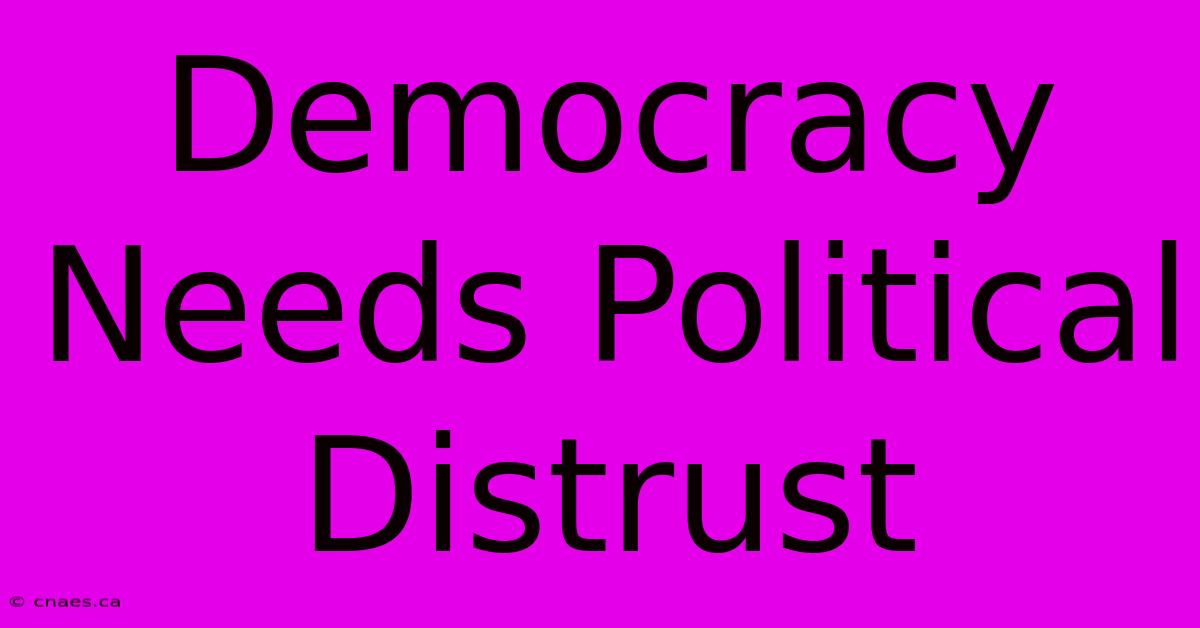Democracy Needs Political Distrust

Discover more detailed and exciting information on our website. Click the link below to start your adventure: Visit My Website. Don't miss out!
Table of Contents
Democracy Needs Political Distrust: A Paradoxical Truth
Democracy, at its core, relies on the active participation and informed consent of its citizens. Yet, a healthy dose of political distrust might be precisely what keeps it thriving. This seemingly paradoxical statement requires unpacking, as it challenges the conventional wisdom that unwavering faith in institutions is essential for a functioning democracy.
The Dangers of Blind Faith
Uncritical acceptance of political narratives and institutions can lead to several significant problems:
Erosion of Accountability: When citizens blindly trust their leaders, there's less pressure to hold them accountable for their actions. Corruption, inefficiency, and abuse of power can flourish in an environment of uncritical acceptance. Distrust, on the other hand, acts as a watchdog, prompting scrutiny and demanding transparency.
Suppression of Dissent: A climate of unwavering faith can stifle dissent and alternative viewpoints. Citizens may be less likely to question the status quo or challenge dominant narratives, hindering the evolution and improvement of democratic systems. Healthy skepticism encourages critical engagement and the expression of diverse perspectives.
Vulnerability to Manipulation: Populist leaders and authoritarian regimes thrive on manipulating public trust. Blind faith makes citizens easy targets for propaganda and misinformation campaigns, undermining the very foundation of informed consent. Distrust serves as a vital defense mechanism against such manipulation.
The Constructive Power of Skepticism
This doesn't mean that democracy thrives on cynicism or nihilism. Instead, a healthy level of political distrust fosters:
Increased Civic Engagement: When citizens are skeptical of political claims, they're more likely to actively engage in verifying information, participating in political processes, and holding their leaders to account. This increased engagement strengthens democracy from the grassroots.
Demand for Transparency and Accountability: Distrust motivates citizens to demand transparency from their government and hold their elected officials responsible for their actions. This pressure leads to greater accountability and improved governance.
Protection Against Authoritarianism: A population with a healthy dose of political skepticism is less likely to fall prey to authoritarian tactics and more likely to resist attempts at undermining democratic institutions. Distrust acts as a bulwark against tyranny.
Navigating the Fine Line
The key lies in finding a balance. While excessive cynicism can lead to apathy and inaction, a healthy level of skepticism fuels engagement and strengthens democratic processes. It is the difference between constructive criticism and destructive negativity. This balance requires:
Informed Skepticism: It's not enough to simply distrust; citizens must be equipped with the critical thinking skills and access to reliable information to assess political claims effectively. Media literacy and critical analysis are vital tools in this regard.
Active Participation: Distrust must translate into action. Citizens should actively participate in political processes, engage in public discourse, and hold their leaders accountable.
Conclusion: A Necessary Tension
The relationship between democracy and political distrust is a complex one, but it's crucial to understand that a certain level of skepticism is not just acceptable but essential. It acts as a vital safeguard against abuse of power, promotes civic engagement, and strengthens the foundations of a healthy and resilient democracy. The challenge lies not in eliminating distrust but in channeling it constructively towards greater transparency, accountability, and participation. This is the delicate balance that ensures democracy’s survival and flourishing.

Thank you for visiting our website wich cover about Democracy Needs Political Distrust. We hope the information provided has been useful to you. Feel free to contact us if you have any questions or need further assistance. See you next time and dont miss to bookmark.
Also read the following articles
| Article Title | Date |
|---|---|
| Review Dexter Original Sin Misses The Mark | Dec 13, 2024 |
| Civic 2025 Pre Order Your Rs | Dec 13, 2024 |
| Ph D Graduate Malaysian Prisoner | Dec 13, 2024 |
| Elden Rings Nightreign Familiar Foes | Dec 13, 2024 |
| Stanley Mug Recall 2 6 Million | Dec 13, 2024 |
